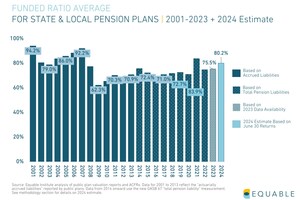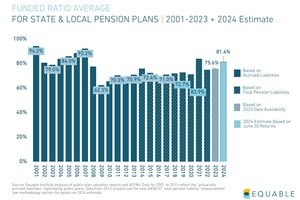Report Finds K-12 Pension Debt Costs Threaten Education Equity in California
BEREKELY, Calif., Jan. 31, 2023 /PRNewswire/ -- Equable Institute and Opportunity Institute have released new research exploring the effect of teacher pension debt on education resource equity in California.
The report, titled Pension Debt Challenges for Equity in Education: The Effect of Teacher Unfunded Liability Costs on K–12 Education Funding in California, found that growing unfunded pension liabilities for teachers and other school employees have silently undermined California's ability to improve education outcomes for students and inequitable impacts on teachers through growing costs and regressive funding mechanisms that subsidize wealthy districts.
"School districts have faced growing pension costs that have outpaced state and local K-12 spending over the past decade. But only a few wealthy communities have been able to handle those contribution rate increases with parcel tax adjustments or other revenues sources," says Equable executive director Anthony Randazzo. "A 2014 law called AB1469 has put most of the growth in CalSTRS pension debt costs on local communities, many of which report having to reduce services in some way to pay for growing pension costs—which had particularly notable effects in exacerbating learning losses during the pandemic. At the same time, the state's regressive pension subsidy is providing more money to wealthier school districts that have the ability to pay teachers more and retain them longer."
Specifically, the report finds:
- An increasing share of California's state and local K–12 education spending is being spent to cover pension costs.
- In 2020, 9.7% of the California state's expenditures on education funding ultimately went to CalSTRS, a 104.7% increase since 2002.
- California retirement costs for teachers and public school employees as a share of combined state and local K–12 spending have grown 176% between 2001 and 2020.
- Overall education spending hasn't increased at the same rate as pension spending. This is effectively a cut to education funding that disproportionately harms low-income communities.
- Over the past two decades, pension spending for teachers and public school staff increased 18.1 percentage points on average per year, while total K-12 spending increased just 3.3.% on average.
- Teacher retirement spending increased at more than six times the rate as K–12 spending from 2014 to 2020.
- The CalSTRS board is likely to lower its investment assumption in the coming years due to market performance trends, which will trigger a need for additional contributions.
- CalSTRS estimated that lowering the investment assumption to a more reasonable 6.5% could trigger a contribution rate increase of between 3% and 5% of payroll, which for the current 2022-23 fiscal year could have meant between $1 billion to $1.6 billion more in required contributions.
Opportunity Institute and Equable Institute note that without increased transparency on how public school employee retirement benefits impact overall school budgets, pension debt costs will continue to exacerbate already existing education resource Inequities.
"Transparency should lead to changes in how retirement benefits are financed," stated Maria Echaveste, President of the Opportunity Institute. "This is necessary to ensure that current and future teachers are able to retire with dignity, but equally important, to make sure students in low-resourced schools have the same access to enrichment programs like music and art, state of the art technology, and are able to attract highly qualified teachers with better compensation--these are examples of budget items that get cut when pension costs overwhelm the local school district budget."
This report is one of four reports detailing the impact of unique pension debt challenges facing state education budgets across the U.S. Please visit pensionequityineducation.org to download California's report along with reports for Texas, Florida, and Ohio.
Equable Institute and Opportunity Institute will be hosting webinars covering the findings of each of the reports in March 2023. Click here to sign up to be notified when registration opens.
The Opportunity Institute (OI) is a national education policy organization that focuses broadly on cradle-to-career education policy, practice issues, and adjacent areas of social policy. Our work bridges the domains of policy, research, advocacy, and addresses equity in three main areas of work: "Whole Child" equity; resource equity; equity indicators.
Equable is a bipartisan non-profit that works with public retirement system stakeholders to solve complex pension funding challenges with data-driven solutions. We exist to support public sector workers in understanding how their retirement systems can be improved, and to help state and local governments find ways to both fix threats to municipal finance stability and ensure the retirement security of all public servants.
SOURCE Equable Institute

WANT YOUR COMPANY'S NEWS FEATURED ON PRNEWSWIRE.COM?
Newsrooms &
Influencers
Digital Media
Outlets
Journalists
Opted In






Share this article